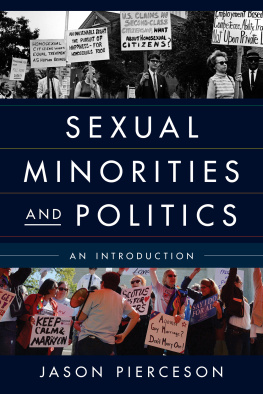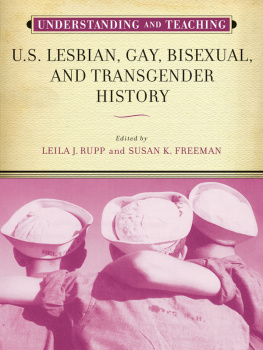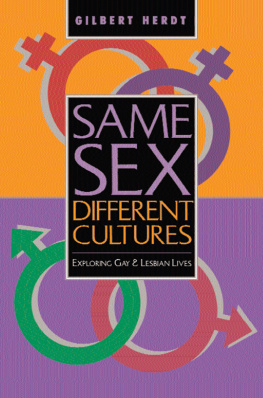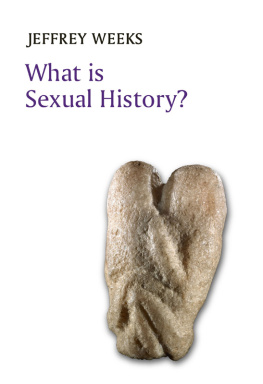The University of Chicago Press, Chicago 60637
The University of Chicago Press, Ltd., London
1983 by The University of Chicago
Preface and Afterword 1998 by The University of Chicago
All rights reserved. Published 1998
Printed in the United States of America
12 11 10 09 08 07 06 05 04 6 5 4 3 2
Library of Congress Cataloging-in-Publication Data
DEmilio, John.
Sexual politics, sexual communities : the making of a homosexual minority in the United States, 19401970 / John DEmilio.2nd ed.
p. cm.
Includes bibliographical references and index.
ISBN-10: 0-226-14267-1 (paper)
ISBN-13: 978-0-226-14267-8 (paper)
ISBN: 978-0-226-92245-4 (e-book)
1. Gay liberation movementUnited StatesHistory. I. Title
HQ76.8.U5 |
305.90664dc21 | 98-24148 |
CIP |

The paper used in this publication meets the minimum requirements of the American National Standard for Information SciencesPermanence of Paper for Printed Library Materials, ANSI Z39.48-1992.
Preface, 1998
When Sexual Politics, Sexual Communities was originally published in 1983, it was one of a handful of pioneering works in gay and lesbian history and, in one sense at least, a first. Until its release, there were no monographs in U.S. gay history, no historical narratives of the gay and lesbian past in this country.
In this preface, I want to reflect upon the conditions that created this book. What provoked me to research and write it? What experiences shaped it (and me)? What assumptions propelled the work forward? In what context were the questions framed, the research done, the answers puzzled through? In the afterword I will turn to another set of issues: How has the passage of time changed my outlook and understanding? In particular, in what ways has subsequent gay and lesbian historical writing modified my interpretation of the homophile movement and the postWorld War II era? And how does the longer view that the end of the century offers complicate assumptions that guided me two decades ago?
Though published in the 1980s, Sexual Politics, Sexual Communities is a product of the 1970s, the historical moment bounded by the Stonewall
Of course, what that something seemed to be depended on ones experience. By the time I came into the gay liberation movement early in 1973, I had managed to construct for myself a very full gay life. I had a lover, a wide circle of gay male friends, and a broad familiarity with the public institutions of the gay subculture in New York Cityfrom bars, restaurants, and cruising strips in the Village, Times Square, and Third Avenue, to parks, the West Side docks, the subways, and the ticket line for the Metropolitan Opera. Entering the orbit of the movement broadened my world in two very important ways. It gave a political edge to my identity as a gay man. And, despite the reputation of the seventies as the separatist decade, I met lesbians for the first time and formed a significant number of important relationships with them.
By the mid-1970s, virtually every gay man or lesbian I knew, whether through social, sexual, or political activities, had a few characteristics in common. We were born in the second quarter of the twentieth century and had consequently come of ageas the work of historians of sexuality now informs usat a time when a particular form of identity, revolving around same-sex desire, was coming to the foreground, and when the conditions of gay life offered a mix of both opportunity and constraint. We all had experienced some kind of struggle, or difficulty, related to our homosexuality. For some, the struggle had been external, an overt conflict with authority of one sort or another; for others, the difficulty had been largely internal, one of having resisted the desires and yearnings that seemed to spring from the core of our selves; for still others, the problems were primarily practical in nature, involving a search for information, understanding, companionship; and for many, it encompassed all three. Despite these struggles, we had also all made the leap toward acknowledging, to ourselves and others in the gay world, that we were homosexual. Finally, almost everyone who filled my gay universe had been touched in some way by the sixties, by the complex of social, cultural, and political upheavals which called into question most forms of authority, knowledge, and institutional arrangements.
Bring those shared characteristics together in the context of a radical liberation movement and one can begin perhaps to apprehend how easily politics came to infuse the very essence of our queer souls. By politics I dont mean elections and candidates and campaigns and voter mobilization. Rather I mean it in the way that word was most often used by radicals of the sixties and early seventies: as collective action for the purpose of changing institutions, power relationships, beliefs, and social practices, whether at the level of the national government and the corporation or at the level of family relationships, schools, and neighborhood institutions.
Because I came to gay liberation through the Gay Academic Union, an effort to mobilize faculty, staff, administrators, and graduate students to make colleges and universities into environments hospitable to lesbians and gays, it was natural that movement work for me and many others in the group should involve the generation of new knowledge. An important strand of the radicalism of the 1960s had focused on what might be called the politics of knowledge. Knowledge, or scholarship, did not exist in a vacuum of objectivity but instead was enmeshed in, subservient to, productive of, or resistant to power relationships and institutional structures. Whether it was the antiwar movement exposing the ties between university researchers and the Pentagon, or the Black Power movement decrying the Eurocentric nature of the curriculum, or radical feminists attacking the gendered assumptions of psychoanalysis, the radical forebears of gay liberation had trained a spotlight on the power of knowledgeto corrupt, to oppress, to empower, to free.
What this meant to me, and to others with whom I collaborated, was that research, writing, and scholarship became activities that counted for something, though not in their own right or detached from the world around them. They mattered because there were connections between knowledge and power, between consciousness and experience, between ideas and action. Changing ideas was one way to provoke other kinds of change, while the actions that we, as a movement, were taking simultaneously altered the conditions of life out of which new ideas might then spring. In other words, it was hard, for me at least, to imagine any kind of gay scholarship without the movement which supported it, while the production of knowledge seemed an essential component of a successful social change movement.
At the same time, intellectual work, at least in the domain of history, seemed hopelessly handicapped by one of the forms that gay oppression took. Sometimes we framed the problem as one of silence imposed by an oppressive society. At other times we expressed it as an issue of lies and myths about us, not noticing the contradiction between these two ways of describing our challenge. In either case, it made the prospect of writing a The dialogue all came from documents that Katz had collected as part of his continuing research for what became, in 1976,






 The paper used in this publication meets the minimum requirements of the American National Standard for Information SciencesPermanence of Paper for Printed Library Materials, ANSI Z39.48-1992.
The paper used in this publication meets the minimum requirements of the American National Standard for Information SciencesPermanence of Paper for Printed Library Materials, ANSI Z39.48-1992.